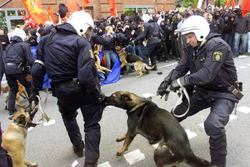A history of violent protest at G20 world trade meetings
Chris Smyth
Violent protests at the World Trade Organisation meeting in Seattle in 1999 caught everyone by surprise. Tens of thousands of anti-globalisation protesters descended on the city, overwhelming an unprepared police force.
The National Guard was brought in to restore order and the mayor imposed a curfew. The summit ended with hundreds under arrest and numerous symbols of American corporate power — McDonald's restaurants, Starbucks coffee shops and Gap stores — in ruins.

Activists opposed to unfettered free-trade “neoliberalism” besieged all manner of economic summits over the next few years. Meetings of the World Economic Forum in Davos, the IMF and World Bank in Prague and the Summit of the Americas were all targeted.
In 2001, about 400 were arrested during the Summit of the Americas in Quebec City that April. At an EU summit in Gothenburg in June, three activists were shot and injured as hundreds of protesters rampaged through the streets.
Then, in July 2001, an anti-globalisation activist was shot dead during the G8 summit in Genoa after days of battles between protesters and police. Hundreds were arrested, dozens were treated in hospital and allegations of police brutality flew.
From then on the trend was towards remote, isolated summit venues that protesters would struggle to reach, and where anarchists would find few
things to smash.In 2002, the G8 met in Kananaskis, a remote Canadian ski-ing resort. Checkpoints were in place to hold back any undesirables long before they got anywhere near the meeting. It passed off smoothly.
After renewed clashes in Evian in 2003, the security effort was stepped up again in 2004.
That year, the G8 summit was held on an island 80 miles off the coast of the US state of Georgia. Even then, the American authorities took no chances. Sea Island was sealed off by land and sea. Surface-to-air missiles were in place along the coast to enforce a no-fly zone.
Catering staff allowed on to the island had to undergo rigorous background checks. Coastal towns nearby were swept by secret service agents with metal detectors and sniffer dogs. Locals said the area had turned into an “armed camp”. There was no trouble.
Although some of the violent fervour seemed to have gone out of the anti-globalisation movement in recent years, the authorities could not relax. In Gleneagles in 2005 — again the G8 was held far from major population centres — 91 people were arrested and weapons seized as protesters tried to reach the venue. Two years ago in Heiligendamm, Germany, almost 1,000 people were injured, including 146 police, during street fighting.
No wonder that the G20 organisers are taking few chances.
Source: http://www.timesonline.co.uk/tol/news/politics/G20/article5947158.ece



